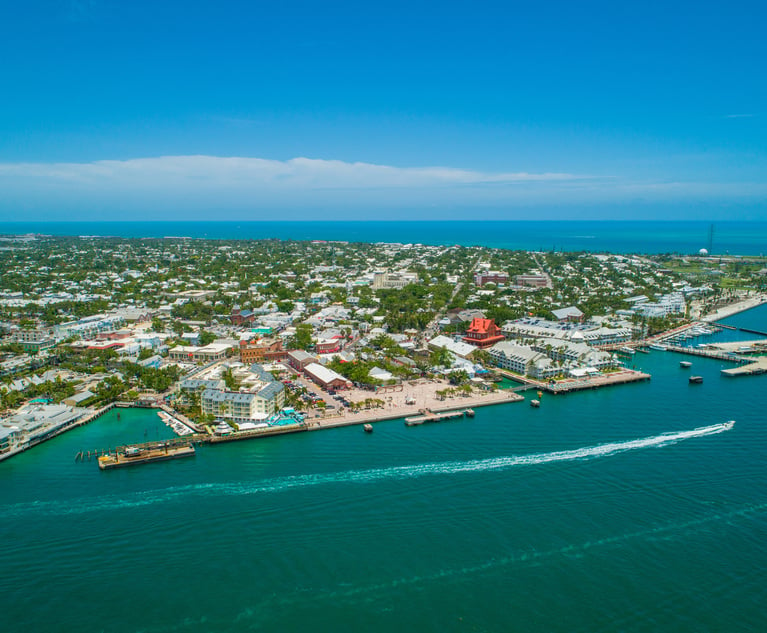Cruising for a Bruising: Passenger Personal Injury Suits Flow, But Crew Member Litigation is Drying Up
While passengers serve cruise companies with lawsuits on a daily basis, crew members don't, thanks to widespread arbitration clauses. Could that change?
March 08, 2019 at 12:47 PM
7 minute read
 Cruise ship in placid waters. Photo: NAN728/Shutterstock.com
Cruise ship in placid waters. Photo: NAN728/Shutterstock.com
Worse things supposedly happen at sea — and when they do, they're usually litigated in South Florida, the nation's main hub for cruise ship litigation.
About two months into 2019, Royal Caribbean Cruises Ltd., Norwegian Cruise Line and Carnival Corp. & PLC have collectively faced more than 50 legal challenges in the Southern District of Florida from passengers hailing from California, Philadelphia, Colorado, Ohio, Canada, Argentina and beyond.
But none of those are crew member lawsuits, which have been pushed out of court by contract clauses compelling arbitration.
 Deborah J. Gander of Colson Hicks Eidson in Coral Gables. Courtesy photo.
Deborah J. Gander of Colson Hicks Eidson in Coral Gables. Courtesy photo.Coral Gables civil trial attorney Deborah J. Gander has seen the changing tide.
Gander represented Royal Caribbean crew member Lisa Spearman from New Zealand, whose hand was crushed by a sliding door during a routine safety drill. When the cruise giant didn't renew her contract, Spearman sued, alleging negligent medical care, poor training and wrongful termination.
The ship set off from Spain but Spearman's case docked in Miami-Dade Circuit, where she won a $20.3 million verdict in June 2018. But if she'd had that accident today, her case would never make it to a jury.
“That was one of the last crew member lawsuits that was still in the court system,” Gander said.
A case in the U.S. Court of Appeals for the Eleventh Circuit — Rizalyn Bautista v. Norwegian Cruise Line — served as the catalyst in 2005, when the court granted NCL's motion to compel arbitration. A slew of crew members had sued over a boiler room explosion onboard its S.S. Norway, docked in Miami.
Now, Magical Cruise Lines Inc., known as Disney Cruise Lines, is one of the few major companies that doesn't compel arbitration, though it does mandate Brevard County as a venue.
But the tide could turn again as lawmakers introduced new legislation Monday — the Forced Arbitration Injustice Repeal (FAIR) Act, intent on quashing forced arbitration.
Gander is hopeful it will succeed as the damages awarded in arbitration pale in comparison to the damages awarded by juries in similar cases.
“Enactment of the FAIR Act would be a significant win for consumers and employees, restoring their rights to a jury trial,” she said.
Related story: Critical Mass: Congress Takes Aim at 'Forced' Arbitration
Miami maritime lawyer John H. “Jack” Hickey suspects crew member arbitrations will eventually become a thing of the past.
“The U.S. Supreme Court has recognized that the Federal Arbitration Act was not meant to apply to transportation workers, including these crew members,” Hickey said.
In two unanimous decisions in January, justices clarified that it's up to a court, not arbitrators, to decide whether the the Federal Arbitration Act applies to agreements.
Hickey represents a Royal Caribbean crew member known as Jane Doe, who alleges a co-worker sexually assaulted and attacked her. Though most of her claims belong under the arbitration umbrella, the intentional and negligent infliction of emotional distress claims she filed in Miami-Dade Circuit Court do not.
Maritime defense lawyer Daniel S. Marcotte isn't so sure that crew member arbitration agreements count as “forced. ” They fit under a collective bargaining agreement greenlighted by a crew members' union, and plaintiffs and defendants have equal reign when selecting arbitrators, who generally don't limit discovery.
“ These are not non-negotiated forms where the arbitration agreement is buried in fine print,” Marcotte said. “In my view, the same concerns that may exist in other arbitration scenarios don't exist as much with crew arbitration.”
If passed, Marcotte is doubtful the FAIR Act would change much for maritime law.
“You see defense verdicts and large awards in arbitration as well as state and federal court,”Marcotte said. “It would simply provide the crew members a public forum.”
Even without that forum, ship employees have unique protections under maritime law. Cruise lines are legally required to provide seaworthy ships, and the Jones Act governs negligence claims, allowing crew members to collect damages from employers.
Ship owners must also abide by maintenance and cure guidelines — a more extreme version of workers' compensation, encompassing any illnesses or injuries.
“Even if your breast cancer manifests while you're on the ship, the cruise ship is required to provide prompt, proper and adequate medical care,” Gander said.
Because of that, Marcotte says cruise lines take great pains to ensure compliance — arbitration or not.
Why South Florida?
The maritime suits that do make it to court are passenger-driven, predominantly personal injury cases stemming from a nasty fall, or a limb trapped in a sliding door. They're also governed by contract clauses.
As most major cruise lines are headquartered in Miami, buying a ticket typically means agreeing to a forum selection clause that keeps lawsuits on their home turf over anywhere else in the world.
A pressing time limit doesn't help either, according to Miami plaintiffs lawyer Louis A. Vucci, who focuses on cruise ship injury law. While Florida's personal injury statute allows four years to file a lawsuit, maritime law gives injured passengers just one year to file.
“Someone may not contact you for four or five months,” Vucci said. “So now you have about five months to bring a lawsuit and you're scrambling to get records.”
Click here to see Royal Caribbean's ticket contract
While it's logical to keep lawsuits in the same city to avoid conflicting decisions and keep corporate counsel on-hand, there are other benefits.
“It may be that [cruise lines] feel they have a positive public image in Miami-Dade because they have such a prevalent presence, which would also explain why Magical Cruise Lines chooses a venue closer to Orlando and the Magic Kingdom,” Gander said.
Marcotte said he's seen some foreign plaintiffs ”fight vigorously” to bring their cases in Miami, even if a forum-selection clause mandates their home country.
“There's more money,” Marcotte said. “The potential for a higher verdict exists in Miami, generally, rather than somewhere else where they might have different laws.”
 David J. Horr of Horr, Novak & Skipp in Miami. Courtesy photo.
David J. Horr of Horr, Novak & Skipp in Miami. Courtesy photo.Miami's diversity can greatly affect trials, according to maritime defense lawyer David J. Horr, which means jury selection is crucial.
“The demographics of South Florida are unique in comparison to other locations in the U.S.,” Horr said. “This creates potential for significant variation in jury venires from case to case.”
Plaintiffs lawyer Vucci agrees.
“The verdicts can be, I would say, fair and reasonable because of the tremendous mix of different nationalities here,” Vucci said. “So people are very open to hearing different arguments because they are from all over the world. That diversity is good, or can be good, for clients.”
Related story: Cruise Company Hit With Million-Dollar Suit Over Passenger's Zip Line Death
For better or worse, having all cruise lawsuits live and die in one forum has generated a close-knit maritime litigation community.
“Cruise line litigation can be difficult, it can be tense, it can be combative,” Vucci said. “Both sides go at it. But I do have respect for the defense lawyers in Miami. They're very forthright when they need to be, but they can be reasonable.”
The feeling's mutual, according to defense lawyer Horr.
“I have a lot of respect for my opposing lawyers,” Horr said. “They're very skilled, and it's a challenge to respond to the imaginative arguments and approaches they'll employ.”
Related story: Carnival Cruise Line Sued Over Tour Bus Rollover in Bahamas
NOT FOR REPRINT
© 2025 ALM Global, LLC, All Rights Reserved. Request academic re-use from www.copyright.com. All other uses, submit a request to [email protected]. For more information visit Asset & Logo Licensing.
You Might Like
View All
Sailing Away From Passenger Safety: How Cruise Lines Turn Their Back on Passengers
6 minute read

DeSantis' Win on 'Vaccine Passport' Ban Creates Constitutional Road Map for Navigating Future Outbreaks
4 minute read
Lawsuit Accuses US Coast Guard of Negligent Towing Off Key West Coast
Trending Stories
- 1Big Law Firms Sheppard Mullin, Morgan Lewis and Baker Botts Add Partners in Houston
- 2Lack of Jurisdiction Dooms Child Sex Abuse Claim Against Archdiocese of Philadelphia, says NJ Supreme Court
- 3DC Lawsuits Seek to Prevent Mass Firings and Public Naming of FBI Agents
- 4Growth of California Firms Exceeded Expectations, Survey of Managing Partners Says
- 5Blank Rome Adds Life Sciences Trio From Reed Smith
Who Got The Work
J. Brugh Lower of Gibbons has entered an appearance for industrial equipment supplier Devco Corporation in a pending trademark infringement lawsuit. The suit, accusing the defendant of selling knock-off Graco products, was filed Dec. 18 in New Jersey District Court by Rivkin Radler on behalf of Graco Inc. and Graco Minnesota. The case, assigned to U.S. District Judge Zahid N. Quraishi, is 3:24-cv-11294, Graco Inc. et al v. Devco Corporation.
Who Got The Work
Rebecca Maller-Stein and Kent A. Yalowitz of Arnold & Porter Kaye Scholer have entered their appearances for Hanaco Venture Capital and its executives, Lior Prosor and David Frankel, in a pending securities lawsuit. The action, filed on Dec. 24 in New York Southern District Court by Zell, Aron & Co. on behalf of Goldeneye Advisors, accuses the defendants of negligently and fraudulently managing the plaintiff's $1 million investment. The case, assigned to U.S. District Judge Vernon S. Broderick, is 1:24-cv-09918, Goldeneye Advisors, LLC v. Hanaco Venture Capital, Ltd. et al.
Who Got The Work
Attorneys from A&O Shearman has stepped in as defense counsel for Toronto-Dominion Bank and other defendants in a pending securities class action. The suit, filed Dec. 11 in New York Southern District Court by Bleichmar Fonti & Auld, accuses the defendants of concealing the bank's 'pervasive' deficiencies in regards to its compliance with the Bank Secrecy Act and the quality of its anti-money laundering controls. The case, assigned to U.S. District Judge Arun Subramanian, is 1:24-cv-09445, Gonzalez v. The Toronto-Dominion Bank et al.
Who Got The Work
Crown Castle International, a Pennsylvania company providing shared communications infrastructure, has turned to Luke D. Wolf of Gordon Rees Scully Mansukhani to fend off a pending breach-of-contract lawsuit. The court action, filed Nov. 25 in Michigan Eastern District Court by Hooper Hathaway PC on behalf of The Town Residences LLC, accuses Crown Castle of failing to transfer approximately $30,000 in utility payments from T-Mobile in breach of a roof-top lease and assignment agreement. The case, assigned to U.S. District Judge Susan K. Declercq, is 2:24-cv-13131, The Town Residences LLC v. T-Mobile US, Inc. et al.
Who Got The Work
Wilfred P. Coronato and Daniel M. Schwartz of McCarter & English have stepped in as defense counsel to Electrolux Home Products Inc. in a pending product liability lawsuit. The court action, filed Nov. 26 in New York Eastern District Court by Poulos Lopiccolo PC and Nagel Rice LLP on behalf of David Stern, alleges that the defendant's refrigerators’ drawers and shelving repeatedly break and fall apart within months after purchase. The case, assigned to U.S. District Judge Joan M. Azrack, is 2:24-cv-08204, Stern v. Electrolux Home Products, Inc.
Featured Firms
Law Offices of Gary Martin Hays & Associates, P.C.
(470) 294-1674
Law Offices of Mark E. Salomone
(857) 444-6468
Smith & Hassler
(713) 739-1250






